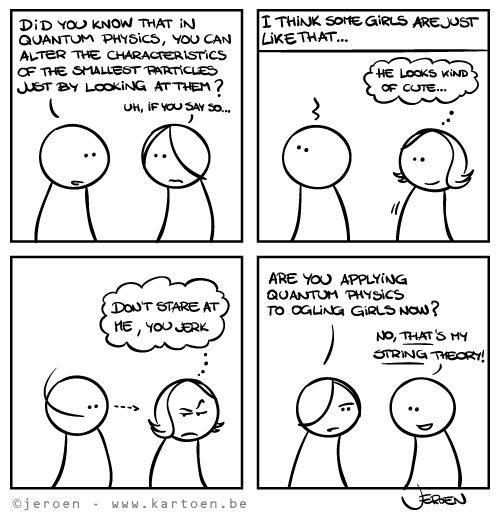Nietzsche's insistence on radical skepticism has annoyed me to the point where I must say something.
nietz wrote:And you claim this is the truth. I say you cannot prove this, that you are making a leap of faith.
'Reality' as perceived is real enough. In order to meet nietzsche's standard of proof, we'd need absolute certainty--e.g. in order for the theory of gravity to be a true description of reality, it would need to be accurate to an infinite amount of decimal places (probability=1). Unfortunately, that standard also undermines nietzsche's claims about what is and what isn't reality since he would also fail to meet such a standard. Nietzsche is bound to cut himself with his
double-edged sword.
The best that we can do is rely on subjective probabilities for claims on reality--e.g. when I twist that door knob, what is the probability that I'm actually touching a door knob and that it'll open the door? My estimated probability = "pretty fuckin' high." But, does "pretty fuckin' high" meet nietzsche's standard of p=1? No, of course not, but nothing does--not even my last claim, but does this mean I must ponder into the depths of my navel and constantly be confused about 'reality'? No, language traps can be avoided, and it still doesn't follow that we must 'throw the baby outta the bath water' by relying on alternative explanations based on the radical skepticism of human abilities to perceive reality. The alternative offered by nietz and seemingly supported by AoG are simply
not warranted.
If you're concerned about the reliance upon subjective probabilities, then you can always compare them to objective probabilities. E.g. what do you think is the probability that you'll die in a car accident v. what is the probability of people dying in car accidents?. However, this is really an issue about people conforming to or failing to conform to Rational Expectations theory. If you're concerned about our ascertaining 'objective' probabilities, then keep reading:
Usefulness of Doubting RealityEven if we concede to all of AoG's and Nietzsche's points, we can ask a practical question: is it
useful to posit radical skepticism/subjectivism? No. It's a deadend, and even worse, its practitioners don't even sincerely follow what they espouse. When nietzsche is about to stand up from his chair, does nietzsche have dreadful moments of skepticism about the reality of the floor? No. He stands up, and everything is fine. "But he can't prove that the floor exists!!!" So what? p=0.99999999999999999999999999999 is good enough. And, if he really did have such problems, he should see a psychiatrist.
Is it useful to take our perception of reality as good enough? Sure, because through that route people invent medicines, provide desirable goods, better homes, greater incomes,
better philosophy, and overall greater prosperity. It's not at all absurd to assume that one's perception of reality
tends to be correct, and although at times people make perceptual mistakes, they can still update. "But there's some chance that the radical skeptics might be true!!" Sure, but again, who cares. I'll keep making practical decisions in the real enough world, and in return I'll keep making real enough profits.
The Usefulness of Radical SubjectivismFinally, although relying on a subjectivist reality implies that nothing can be ascertained with certainty, that failure isn't a serious problem for some people, and for most people, that problem is ignored--e.g. "God does exist" v. "God does not exist." Note: p=1 in their claims. How can this problem resolved?
(1) Most people think what they want and continue with their lives as usual (because thinking is costly).
(2) Some people approximate the Truth by comparing varying degrees of evidence for different claims--dependent upon their criteria of truth (e.g. Scientific Method, various theories, prior assumptions like "what I observe is real enough").
For example, consider these claims: 2+2=4 is true v. Judeo-Christian God exists. Recall how some people use different criteria for determining the truth, or 'truth', of each, and notice how some groups flip their standard of evidence/Truth for each claim. This dilemma can be explained: some people don't care to update their analytical tools or to beat down their cognitive biases. It might be too costly for them.
Nevertheless, even within 'subjectivist' reality, some claims are truer than others, but that ascertaining of truth is dependent upon one's criteria for truth, so discrepancies in the claims of truth have causes which can be identified and examined. The Scientist/Philosopher is already on his way to rendering this world more sensible while the radical skepticist or radical subjectivist would still be stuck on stage 1: assume reality is real enough. "Never!" Ask a radical subjectivist if Nazism is morally good and watch how little usefulness is gleaned for their stance. Watch the unwillingness to compare the validity of various claims. In the real enough world, some people can hold wrong moral claims (where p = 0.99999999999), and we can know this by filtering claims through sensible criteria.
In short, it still doesn't follow that our entire sensory mechanism should be completely doubted, thus we should seriously question our perception constantly. Reality-doubters and radical subjectivists need not be taken seriously (and here I am, wasting time, taking them seriously).
[god damn, 1 hour spent on that. Back to BBS-prohibition mode].






























































































































